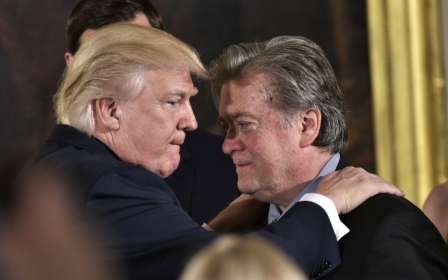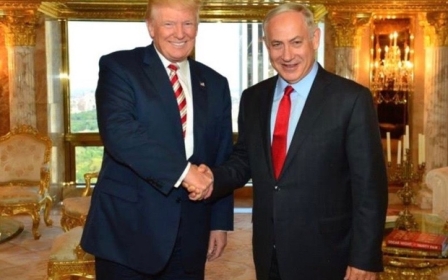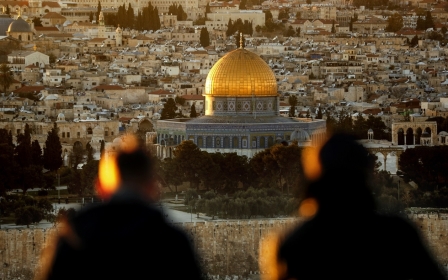White House signals end of support for two-state solution ahead of meeting

Palestinian leaders have criticised the White House for breaking with decades of American support for a two-state solution to the Israeli-Palestinian conflict ahead of a meeting between US and Israeli leaders in Washington.
Trump is to host Israeli Prime Minister Benjamin Netanyahu at the White House on Wednesday, and is expected to express his desire to help broker a solution to the conflict.
But a senior White House official said on Tuesday that the United States was no longer wedded to the creation of a Palestinian state alongside Israel and would no longer seek to dictate the terms of any eventual peace settlement. Instead it would support what the two sides agree to together.
'This is not a responsible policy and it does not serve the cause of peace'
- PLO executive committee member Hanan Ashrawi
"A two-state solution that doesn't bring peace is not a goal that anybody wants to achieve," the official said on condition of anonymity. "Peace is the goal, whether that comes in the form of a two-state solution if that's what the parties want, or something else if that's what the parties want.
"That's going to be up to them, we are not going to dictate what the terms of peace are going to be,"
PLO executive committee member Hanan Ashrawi told AFP on Wednesday: "This does not make sense. This is not a responsible policy and it does not serve the cause of peace. They cannot just say that without an alternative."
UN Secretary General Antonio Guterres also said that a two-state solution was necessary. Speaking in Cairo on Wednesday after he met Egyptian President Abdel Fattah al-Sisi, Guterres said “there was a complete agreement" that a resolution needs a "two state-solution and that everything must be done to preserve that possibility.”
And French ambassador to the United Nations Francois Delattre said that France’s “commitment to the two-state solution is stronger than ever.”
So what Trump's plan?
Big questions remain as to the mechanics of how Trump might help bring peace to the Israel-Palestine conflict.
For the better part of half a century, successive US governments - both Republican and Democrat - have backed a two-state solution, which formed the basis of peace talks at Oslo in 1993 and Camp David in1978.
But Netanyahu won re-election in 2015 by insisting he would not accept the creation of a Palestinian state, a vow that considerably soured relations with the Obama-era White House.
Friedman, who has yet to be confirmed as US ambassador to Israel, will not be at Wednesday's talks.
That tune, which was music to Netanyahu's ears, as well as the increasingly restive right-wing within his coalition, has since changed, making Wednesday's talks critical for clarity.
Trump appears to have put the embassy move on the backburner, at least for now, after warnings about the potential for regional unrest, including from Jordan's King Abdullah.
READ: If the US embassy moves, Jordan stands to lose big time
Rather than giving Israel free rein on settlements, the White House has said building new ones or expanding existing ones beyond their current borders would not be helpful to peace.
That would seem to leave Israel room to build within existing settlements without drawing US condemnation - which is the sort of gray area the talks are expected to touch on.
Switch in approach could anger Muslim world
For the Palestinians, and the vast majority of UN member states, settlements built on occupied land are illegal under international law. Israel disputes this, but faces increasing criticism over the policy from allies, especially after Netanyahu's announcement in the past three weeks of plans to build 6,000 new settler homes across the West Bank.
Netanyahu committed to the two-state goal in a speech in 2009 and has broadly reiterated the aim since. But right-wing members of Netanyahu's government oppose the creation of a Palestinian state and seek the fulfilment of a "greater Israel" through annexation of the West Bank and Jerusalem.
'As the president has made clear, his administration will work to achieve comprehensive agreement that would end the Israeli-Palestinian conflict so that Israelis and Palestinians can live in peace and security'
- Sean Spicer
Netanyahu has spoken of a "state minus," suggesting he could offer the Palestinians deep-seated autonomy and the trappings of statehood without full sovereignty. But the Palestinians want an independent state in the West Bank and Gaza, with the capital in East Jerusalem, which Israel seized in the 1967 Middle East war.
Trump's position on the two-state solution remains unclear. He has said he wants to do the "ultimate deal" and has named his son-in-law, Jared Kushner, as a senior Middle East adviser and lawyer Jason Greenblatt as his special representative for international negotiations.
Kushner has forged ties with Israel's ambassador to Washington, Ron Dermer, a Netanyahu confidant, and has met with Arab diplomats, according to people familiar with the matter.
READ: Trump and Netanyahu wasn’t supposed to be like this
The Trump administration is tentatively exploring whether US Sunni Arab allies - which have had growing behind-the-scenes contacts with Israel, mostly over their shared concerns about Shia Iran - might cooperate in any future Israeli-Palestinian diplomacy, the sources said.
Any sign of a softening of US support for eventual Palestinian statehood could anger the Muslim world. Prospects for any serious new diplomatic initiative remain unclear: the last peace efforts collapsed in early 2014.
"As the president has made clear, his administration will work to achieve comprehensive agreement that would end the Israeli-Palestinian conflict so that Israelis and Palestinians can live in peace and security," White House spokesman Sean Spicer told reporters on Tuesday.
New MEE newsletter: Jerusalem Dispatch
Sign up to get the latest insights and analysis on Israel-Palestine, alongside Turkey Unpacked and other MEE newsletters
Middle East Eye delivers independent and unrivalled coverage and analysis of the Middle East, North Africa and beyond. To learn more about republishing this content and the associated fees, please fill out this form. More about MEE can be found here.





